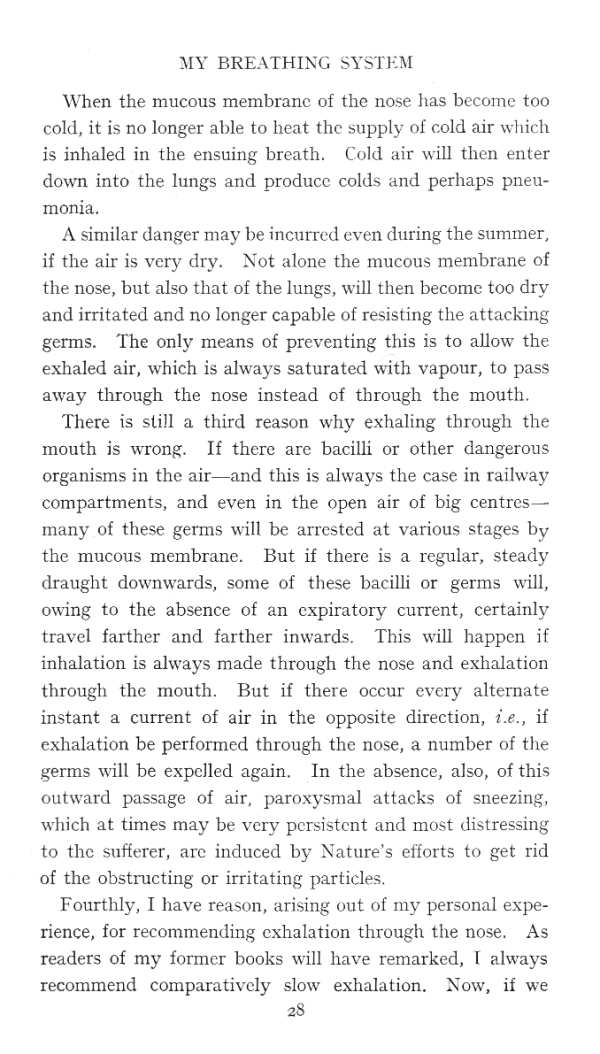69745 mbs 028

MY BREATHING SYSTEM
When the mucous membranc of the nose has become too cold, it is no longer able to beat the supply of cold air which is inhaled in the ensuing breath. Cold air will then enter down into the lungs and producc colds and perhaps pueu-monia.
A similar danger may be incurred even during the sommer, if the air is very dry. Not alone the mucous membranę of the nose, but also that of the lungs, will then become too dry and irritated and no longer capable of resisting the attacking germs. The only means of preventing this is to allow the exhaled air, which is always saturated with vapour, to pass away through the nose instead of through the mouth.
There is slill a third reason why exhaling through the mouth is wrong. If thcrc are bacilli or other dangerous organisms in the air—and this is always the case in railway compartments, and even in the open air of big centrcs— many of these germs will be arrested at various stages by the mucous membranę. But if there is a regular, steady draught downwards, sonie of these bacilli or germs will, owing to the absence of an cxpiratory current, certainly travel farther and farther inwards. This will happen if inhalation is always madę through the nose and exhalation through the mouth. But if there occur every alternate instant a current of air in the opposite direction, i.e., if exhalation be performed through the nose, a number of the germs will be expclled again. In the absence, also, of this outward passage of air, paroxysmal attacks of sneezing, which at times may be vcry persistent and most distressing to the sufferer, are induced by Nature's efforts to get rid of the obstructing or irritating particles.
Fourthly, I have reason, arising out of my personal expe-rience, for recommending cxhalation through the nose. As readers of my former books will have remarked, I always recommend comparatively slow exhalation. Now, if we
28
Wyszukiwarka
Podobne podstrony:
mbs 022 MY BREATHING SYSTEM against the invasion and throw ol f thc gernis, which arc ejected with t
mbs 055 MY BREATHING SYSTEM Whcn the diaphragm is not paralysed it readily follows thc movcment of t
52396 mbs 043 MY BREATHING SYSTEM when we spend our time in crowded halls in poisonous air, or are f
mbs 005 MY BREATHING SYSTEM BYLIEUT. J. P. MI LLER, K.D. Author of My System," " My System
mbs 012 MY BREATHING SYSTEM body, lack that liarmony of all-round developmcnt which is so essential
43484 mbs 050 MY BREATHING SYSTEM diaphragm which is brought into a nearly vertical position when th
mbs 014 MY BREATHING SYSTEM slow, regular respiration, even during the hardcst and most protracted e
mbs 027 MY BREATHING SYSTEM sucked in. For persons who lind it very difficult to acquire tłiis contr
więcej podobnych podstron